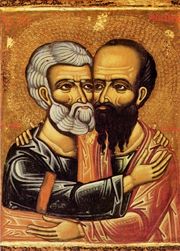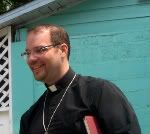a priest's musings on the journey
Sunday, January 21, 2007
Sermonette: Epiphany 3 C Day 4 Octave of Prayer for Christian Unity

This week the Church’s attention has been focused on prayer for Christian Unity. From the beginning it was our Lord’s prayer that we be One, even as the Father and the Son are One. This unity does not mean that we all have to be alike. God has gifted humanity with diverse experiences of God. We relate to God differently; we pray differently; we have different liturgies and hymnody; certain parts of the Gospel Story intersect with our personal stories in ways that they do not with others. And yet, in the midst of all of this wonderful diversity, the same Holy Spirit broods over us all, uniting us all to Christ, fashioning us all to be the Body of Christ, empowering us all for the same mission of reconciling all the world to God.
This years theme for this Octave of Prayer for Christian Unity, taken from he Gospel of Mark, is Open our ear and loosen our tongues. Our prayer is that the Holy Spirit will open our ears to hear the stories of our brothers and sisters, especially those who are poor and oppressed. Likewise we pray that the Holy Spirit will empower those who have been silenced and unable to tell their stories of faith and their struggle to belong to Christ’s Body to speak the truth of their experience with God and the Church. We pray that the silence will be broken and the truth spoken, so that the Truth can set us all free. Our divisions are rooted in the denial of truth telling, in the fear of listening to a different experience of God, and in the unwillingness to accept those members of the Body of Christ that we feel are inferior, unnecessary or even diseased. Instead of seeking healing and wholeness, it seems easier to remove the perceived diseased members.
However, when even the most insignificant member of the Body is removed, the entire Body is unable to function. St Paul, in today’s Epistle reading, put it this way:
14Indeed, the body does not consist of one member but of many. 15If the foot would say, “Because I am not a hand, I do not belong to the body,” that would not make it any less a part of the body. 16And if the ear would say, “Because I am not an eye, I do not belong to the body,” that would not make it any less a part of the body. 17If the whole body were an eye, where would the hearing be? If the whole body were hearing, where would the sense of smell be? 18But as it is, God arranged the members in the body, each one of them, as he chose. 19If all were a single member, where would the body be? 20As it is, there are many members, yet one body. 21The eye cannot say to the hand, “I have no need of you,” nor again the head to the feet, “I have no need of you.” 22On the contrary, the members of the body that seem to be weaker are indispensable, 23and those members of the body that we think less honorable we clothe with greater honor, and our less respectable members are treated with greater respect; 24whereas our more respectable members do not need this. But God has so arranged the body, giving the greater honor to the inferior member, 25that there may be no dissension within the body, but the members may have the same care for one another. (1 Cor. 12)
It is difficult for me to understand how easily it is for some Christians to anathematize and refuse to be in communion with other members of Christ’s body because of disagreements on how to interpret certain areas of the faith. I do not seem to recall Jesus praying, “Father, make them all one so they will develop perfect theologies and be in agreement on what Christians must believe in order to be saved.” Instead, the Gospel seems to say that our unity is found in our common incorporation into Christ, and our common participation in His mission to liberate the oppressed, rescue the lost, restore the outcast, and reconcile the estranged. St Paul seems to teach that this mission can only be carried out if each of us is willing and permitted to participate in it. Once any member is excluded or dismembered, the work of bearing Christ in the world and making witness to God’s Reign is diminished and hampered.
Instead of scrutinizing each others theologies, we should be discerning how it is that we are called to carry out Christ’s mission in the world. We need to be asking ourselves what that mission looks like and how we are empowering each other to do the work of ministry. The core of Christ’s mission can be found in his inaugural sermon in his hometown synagogue, after he returned to Nazareth after having spent some time away in public ministry. He opened the scroll from Isaiah and read:
The Spirit of the Lord is upon me, because he has anointed me to bring good news to the poor. He has sent me to proclaim release to the captives and recovery of sight to the blind, to let the oppressed go free, to proclaim the year of the Lord’s favor (Luke 4:18-19).
Then he sat down to give his midrash on the text; and, he simply said, “Today this Scripture has been fulfilled in your hearing.” The first step in finding our unity in Christ is to pay attention to what has been fulfilled in our hearing. Who is it that Christ has come to save? Who is it that God favors? Who is it that receives the mercy and grace of God? Who are the ones that are honored by God? At the end of the day, it is all of us who are poor, and captive, and oppressed. It is each of us who has been favored by the Lord. It is each of us who have been made indispensable members of Christ’s body. God has entrusted the success of His mission in the world with each of us- and has given each of us gifts and abilities to use to bring it to pass.
If this is true, then our first call is to open our ears to hear God’s word, not only in the Bible, not even primarily in the Bible, but in the Logos, in Jesus the Word made flesh. And if we are all members of Christ’s body, then God’s word is to be found in each of us who are striving to live and love as Christ did. Our stories have been immersed into God’s Story, and through our lives, Christ is known and made known. As we listen to one another, and give voice to the voiceless ones, then Christ is manifested among us, and we see our common baptismal identity and can begin to discern our common mission. Then, instead of fighting and separating ourselves from the other members, we will begin to care for one another; we will begin to honor the weaker and smaller parts, and value them for the roles they play in the life of Christ’s Body.
As we listen to the Good News of Christ’s liberating ministry, and thereby allow God to liberate us, then we are able to share in that work of recovery of sight to the blind, setting the captives free, and liberating the oppressed. Then we are able to open the ears of the deaf and loosen the tongues of the mute, so that all may be able to tell the story of how they experience and know God. Then we will discover the unity that God has given us, as the one body of Christ- a union that is not merely metaphorical, but an ontological reality, birthed and formed by the Holy Spirit. A reality that is not dependent on “getting our theology right”, but rather is dependent on knowing Jesus, being united to Jesus, and living and loving as Jesus did.
Open our ears, O God, that we may be able to hear God’s word; Open our lips that we may proclaim the Lord’s favor and speak the liberating Gospel to every creature; Open our hearts to receive the love of Christ and to share it with the oppressed, the outcasts, and the poor.
:: posted by Padre Rob+, 2:31 PM
3 Comments:
"God’s word is to be found in each of us who are striving to live and love as Christ did. Our stories have been immersed into God’s Story, and through our lives, Christ is known and made known. . . . A reality that is not dependent on “getting our theology right”, but rather is dependent on knowing Jesus, being united to Jesus, and living and loving as Jesus did."
That is the escence of my faith: To know Him and to make Him known.
Thanks Rob! Here's a link to my page Jesus' Prayers For Unity
Barry from MySpace
That is the escence of my faith: To know Him and to make Him known.
Thanks Rob! Here's a link to my page Jesus' Prayers For Unity
Barry from MySpace
, at 5:30 PM
I'm blessed to have 3 or 4 sermons on the same passage to read and analyze every sunday.
As usual, Rob, yours was touching and original. I'm proud of you too, much more you could imagine.
As usual, Rob, yours was touching and original. I'm proud of you too, much more you could imagine.
Bush is forever saying that democracies do not invade other countries and start wars. Well, he did just that. He invaded Iraq, started a war, and killed people. What do you think? Why has bush turned our country from a country of hope and prosperity to a country of belligerence and fear.
If ever there was ever a time in our nation's history that called for a change, this is it!
The more people that the government puts in jails, the safer we are told to think we are. The real terrorists are wherever they are, but they aren't living in a country with bars on the windows. We are.
If ever there was ever a time in our nation's history that called for a change, this is it!
The more people that the government puts in jails, the safer we are told to think we are. The real terrorists are wherever they are, but they aren't living in a country with bars on the windows. We are.
, at 8:27 AM



